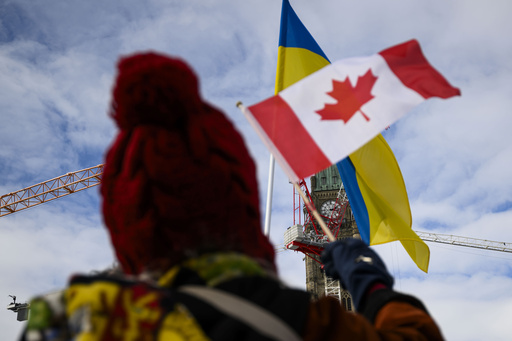KYIV, Ukraine — A significant gathering of leaders from Europe and Canada took place in Ukraine’s capital on Monday to commemorate three years since Russia launched its invasion. Notable figures such as European Commission President Ursula von der Leyen and Canadian Prime Minister Justin Trudeau participated in the events, where they engaged in discussions with President Volodymyr Zelenskyy focused on continuing support for Ukraine in the ongoing conflict.
This anniversary comes amidst a shift in U.S. policies regarding Russia and Ukraine under President Donald Trump. The situation underscores the complexities and changing dynamics of international relations in the face of the ongoing war.
In his address, Prime Minister Trudeau expressed admiration for President Zelenskyy’s courage and determination during these challenging times. He stated, “Your remarkable personal bravery, resilience, and resolve continue to inspire not only me but tens of millions of Canadians across the country.” Trudeau countered the Kremlin’s claims, recently echoed by Trump, suggesting that Ukraine was to blame for the conflict’s escalation. “This is not a conflict Ukraine wanted, provoked, or asked for. It was started solely due to Russia’s intention to erase Ukrainian history and expand its territory,” he declared.
Dutch Prime Minister Dick Schoof remarked on the tumultuous weeks leading up to the anniversary, asserting that Europe is faced with historical challenges. He indicated hope that this occasion could signal the beginning of the war’s end. “Today marks the start of the fourth year of this grotesque war. Let us wish it also signifies the turn towards peace,” Schoof stated.
Finnish President Alexander Stubb emphasized the importance of defining non-negotiable terms in discussions to conclude the conflict, such as Ukraine’s membership in the EU and NATO. “It is not Russia that decides on EU or NATO membership,” he declared, insisting that Ukraine’s sovereignty must remain intact and that the present European security framework should be upheld against Russian pressures.
Stubb also highlighted the need to honor Ukrainian heroes on this significant anniversary, stating, “This is a moment to acknowledge that Putin has lost this fight.” He envisaged a future where Ukraine is fully integrated into Europe and NATO, affirming a crucial stance on providing a strategic victory for Ukraine.
Meanwhile, amid the commemorations, Chinese President Xi Jinping and Russian President Vladimir Putin engaged in discussions, reaffirming their close ties amid ongoing Western sanctions against Russia. This relationship has resulted in China becoming a key ally and customer for Russian resources.
On the sanctions front, President Putin’s spokesperson Dmitry Peskov criticized the recent EU measures as hindering any opportunities for dialogue with Europe. He indicated that the sanctions reflected a belief among European nations that the conflict should persist, contrasting the U.S. attempts to resolve the situation. Peskov lauded American efforts to understand the origins of the conflict as a move in the right direction.
Czech President Petr Pavel voiced his concerns over the ongoing aggression, expressing certainty that Russia aims to erase Ukraine’s identity. He noted the unwavering spirit of the Ukrainian populace and emphasized the need for a peace that respects Ukraine’s sovereignty and integrity.
In Marseille, an incendiary device exploded outside the Russian Consulate on the anniversary of the invasion, though there were no injuries reported. Authorities responded with bomb disposal experts, following an investigation to address the attack, which Russian officials condemned as a terrorist act.
In an effort to exert pressure on Moscow, the European Union implemented new sanctions targeting Russia’s maritime operations related to oil transportation and stolen Ukrainian grain. These measures have seen additional asset freezes and travel bans on numerous Russian officials, with the aim of hampering the war efforts.
German President Frank-Walter Steinmeier reiterated the necessity to support Ukraine resolutely as a foundational principle for peace and freedom in Europe. He made it clear that Germany would provide ongoing humanitarian and military assistance to Ukraine for as long as the conflict continues.
Additionally, the European Union’s foreign policy chief insisted that any peace agreements resulting from U.S.-Russia dialogues must involve both Ukraine and European nations, highlighting the importance of unity and collaboration.
As the UN General Assembly prepared to vote on competing resolutions regarding the conflict—one backed by Ukraine demanding an immediate Russian withdrawal and another from the U.S. calling for a swift cessation of hostilities—tensions between U.S. strategic interests and Ukraine’s demands became increasingly evident.
On the diplomatic front, President Zelenskyy announced that previously contentious proposals regarding Ukraine’s rare earth mineral resources had been discarded, signaling a movement towards a more balanced agreement that respects Ukraine’s sovereignty and ensures future security guarantees amid ongoing threats.


